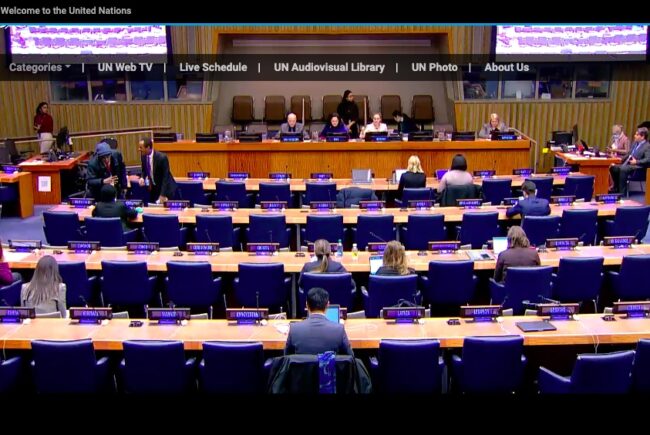MMM applauds the Care resolution adopted by the Commission on Social Development
18.02.24
UN New York, CSocD62 - The title of the resolution, “Promoting care and support systems for social development”, makes it clear that Care and Support are directly linked to the three core themes of social development, namely: poverty eradication, full and productive employment and decent work for all, and social integration. While these three central themes are particularly relevant for women, especially mothers, the resolution shifts the issue beyond gender equality.

The resolution reminds Member States that it is their responsibility to “foster a care society in which all receive the care they need, promoting their rights and well-being, based on the principles of equality and non-discrimination, access to basic social services and promotion of the active participation of every member of society as well as a collective responsibility, involving individuals, families, communities, States and the private sector” – something we at MMM have repeatedly called for in various UN fora.
Conversely, the resolution also “recognises that both paid and unpaid care and support work benefits societies, economies, families and individuals alike” – yet one more key point we have consistently raised in our advocacy: investing in support for mothers and other caregivers benefits everyone.
As an active member of the advocacy group of the NGO Committee on Social Development, MMM was able to provide input in the course of the negotiations. We are in particular delighted that our suggestion to use agreed language from the October 2023 Human Rights Council resolution to add a paragraph on parents was taken up. The new Care resolution acknowledges that “States should render appropriate assistance to parents and legal guardians in the performance of their child-rearing responsibilities […|”, noting that “children’s development depends on the existence of, and access to, a set of adequate family-oriented, community and State care policies”.
We are also gratified that the new resolution specifically refers to “working mothers” when talking about the need to adopt measures to reduce, redistribute and value unpaid care and domestic work. The use of the word ‘mother’ is unfortunately very rare in the UN context, so this was a hugely welcome addition and one that we wholeheartedly endorse.
Like the other two resolutions on Care which were adopted by the UN General Assembly and the Human Rights Council in 2023, this new resolution is the result of an initiative led by countries of the Latin America region (namely Argentina, Brazil, Chile, Colombia, Dominican Republic, El Salvador, Mexico and Paraguay), with other supporting Member States from other regions joining in the course of the negotiations.
The draft resolution on Promoting care and support systems for social development was adopted by consensus during the closing session of the 62nd session of the UN Commission on Social Development.
![]() Full text of the resolution for download (UN ref. E/RES/2024/4)
Full text of the resolution for download (UN ref. E/RES/2024/4)
The New EU Gender Equality Roadmap : A Call for Inclusion of Mothers
04.03.25
The European Commission’s initiative on a new Gender Equality Roadmap post-2025, marks a significant step forward in addressing gender disparities across the European Union. Make Mothers Matter (MMM
Breaking the Cycle: Gender Equality as a Path to Better Mental Health
18.03.25
The Council of the European Union has taken a decisive step in recognising the vital connection between gender equality and mental health.
Europe Must Listen to Mothers: Our landmark report heads to the European Parliament
28.08.25
On 22 September 2025, the voices of mothers will take centre stage in Brussels. For the first time, Make Mothers Matter (MMM) will present its State of Motherhood in Europe








